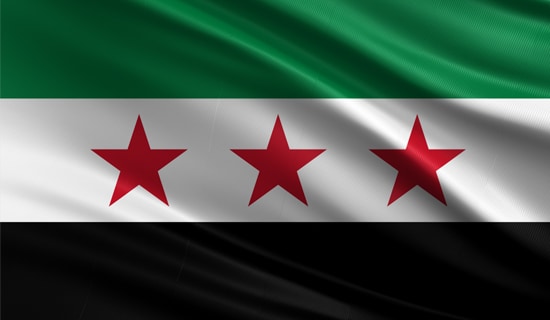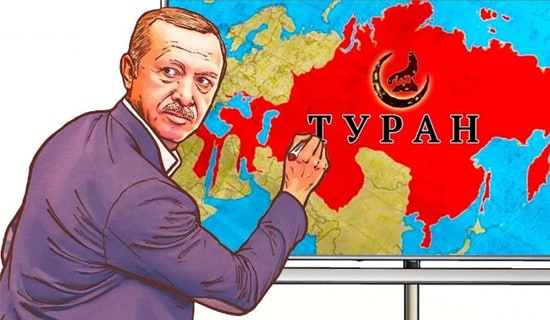
"Iraqi Christian" Militia Leader at PMU Assault on U.S. Embassy, Baghdad
The late IRGC Qods Force commander Qassem Soleimani has had quite the media afterlife. After his killing, Swedish public television described him as "a top diplomat" and a "super-celebrity."[1] While some American media outlets referred to him as "flamboyant," or a "warrior-philosopher" and gushed at his massive funeral, Middle Easterners outside the orbit of Iran tended to have much more caustic views of the man.
Many fine pieces have already been written about this person and about U.S. policy and Iranian aspirations in the region. But more interesting to me are two assertions made in various eulogies about Soleimani in various Western publications, about the fight against ISIS and about the treatment of Christians. These are assertions which reveal a fundamental misunderstanding, not just about how Iran works, but how all regimes in the Middle East work.
Some of the coverage of Soleimani's liquidation was driven by how much the writer despised President Trump and the U.S. administration's foreign policy. So it is not surprising that the idea that "Soleimani played a key role in the defeat of ISIS" appeared regularly.[2] This was a talking point trumpeted by pro-Iran and Assad propagandists but that also seeped into the mainstream press.[3] Of course, Soleimani and Iran fought ISIS in Iraq after 2014. Soleimani and Iran, and their proxies, also played a key role in the growth and revival of the "Islamic State" in the region.
The extreme sectarian role played by Iranian-controlled Iraqi politicians such as former prime minister (2006-2014) Nouri Sl-Maliki and the late Abdul Mahdi Al-Muhandis was a key ingredient in the rise of ISIS. It is Maliki who persecuted Iraqi Sunni politicians and tried to dismantle anti-Islamic State Sunni tribal militias built up by the Americans. The former prime minister was both an extreme sectarian and so corrupt and incompetent that ISIS took the city of Mosul with at most 1,500 fighters against 30,000 soldiers and police in that city. Iran, who installed Maliki with the acquiescence of confused American officials, also bears blame for this debacle.
Al-Muhandis, killed in the drone strike that took out Soleimani, oversaw sectarian militias that sometimes fought ISIS and other times served as death squads, killing activists, torturing prisoners, and engaging in industrial level corruption. While these Popular Mobilization Units (PMU) did indeed play a role in the war against ISIS, their role was also hyped by pro-Iranian Iraqi media for political reasons. The most effective Iraqi units fighting against ISIS were not those units controlled by Iran but often those professionals that were trained by the Americans.
But Iranian complicity in the growth of their supposedly Salafi-jihadi arch enemies doesn't end there. It was Bashar Al-Assad's regime that ran a ratline for years from Damascus International Airport to the Iraqi border, facilitating the move of thousands of jihadis into Iraq to kill both Americans and Iraqi security forces. In Lebanon, in 2017, it was Hizbullah – the most potent of Iran's proxies – that secured a deal moving hundreds of ISIS fighters to the Syrian-Iraqi border where they could take up arms against U.S.-backed SDF fighters or cross back in Iraq.[4] Iran supports Sunni Islamist Hamas and Sunni jihadi Palestinian Islamic Jihad (PIJ). And, of course, it was Iran that provided safe haven, implemented by the Islamic Revolutionary Guard Corps (IRGC) and featuring Soleimani himself, for Al-Qaeda's senior leadership and much of his family.[5]
This should not surprise us. While Iran is America's major adversary in the region, this duplicity in using the most toxic forces available against your adversaries or keeping them in reserve to unleash is not limited to that regime. Brynjar Lia's magisterial biography of jihadi mastermind Abu Mus'ab Al-Suri notes in passing that after Abu Mus'ab fled Syria in the 1980s, he may have gotten some help from Jordan, Egypt and Iraq – all of them states openly against jihadism – because, of course, anti-Assad regime fighters may be useful one day against the regime in Damascus. The Assad regime helped PKK Kurdish rebels against Turkey at the same time that it repressed its own Syrian Kurdish population. Hypocrisy has always been a useful tool of statecraft. So there is no contradiction between Soleimani "the fighter against ISIS," and "Soleimani, nurturer of ISIS/Salafi-jihadism."
The other simplistic, misleading line in the Soleimani eulogies is that he/Iran "saved Middle East Christians."[6] There seems to be a lot of saving going on. If you follow the discourse of most regimes in the Middle East evidently, they are all "saving Christians" even as those populations diminish. You can hear variations of it in Cairo and Damascus and Beirut and Tehran.[7] The reality is that just as ISIS used the persecution of Christians to burnish their Salafi-jihadi credentials, so do Middle East regimes use "their" Christians to burnish an image of tolerance which is less than meets the eye if you look closely.[8] This is the use of Christians as props, as window dressing or puppets, to win sympathy in the West and to disguise a naked thirst for power. In Iraq and Syria, Christians lose property to militias and mafias motivated by greed. In Mosul, absent Christians find that their property is seized and sold without their permission or knowledge by militia-connected gangsters. But lip-service about Christians is commonplace in the region.
Among Soleimani's many "accomplishments" was planting two predatory, mostly Shi'a militias (30th and 50th PMU "brigades") in the heart of Iraq's tiny but majority Christian Nineveh Plains region where they obstruct the region's fragile revival to this day.[9] One of these, the "Babylon Brigade," is often described as a "Christian" militia but is anything but that. Some Iraqi Christians even whisper that this unit's leader Rayan Al-Kildani, now facing U.S. sanctions, is no longer a Christian, that he has secretly converted to Shi'a Islam. Whatever is in his heart, he is a faithful servant of Iran and was present on December 31, 2019 when Iranian-controlled militias attacked the U.S. Embassy in Baghdad.[10]
While Kildani is an extreme example, his is a type that exists throughout anywhere in the region where there are still local Christian communities on the ground. He is a "Christian" leader whose real constituency is not those communities but the state or the organization (Hizbullah in Lebanon, the PMU in Iraq, the Assad regime or the YPG in Syria) calling the shots on the ground.
Even in Lebanon, the country which still has the highest percentage of Christians, the autonomy and freedom of action of those Christians is being eroded as the "Rayan Al-Kildani paradigm" gains ground.[11] Lebanon features the strange phenomenon of ugly sectarian Christian discourse while at the same time deeply beholden to Hizbullah.[12] One of the great hopes of Lebanon's lively popular protest movement is that it is both loosely against extreme sectarianism by any group and to some extent anti-Hizbullah.
So a good rule of thumb in thinking of the legacy of the late Qassem Soleimani is to treat any mention of his or the regime he represented "fighting ISIS" or "saving Christians" with some care. And may the same skepticism apply to claims made by other regimes trumpeting their noble intentions.
*Alberto M. Fernandez is a retired U.S. Ambassador and President of Middle East Broadcast Networks (MBN).
[1] Samnytt.se/svt-pudlar-efter-att-ha-presenterat-terroristgeneral-som-toppdiplomat/, January 6, 2020.
[2] Cnn.com/middleeast/live-news/baghdad-airport-strike-live-intl-hnk/h_02d5a17ad0eebe80128bda0388b8be36, January 4, 2020.
3] Commondreams.org/views/2020/01/11/all-times-us-allied-soleimani-against-common-enemies-giving-him-air-support-tikrit, January 11, 2020.
[4] Apnews.com/1bfc3d8bb609414eba2496dadb7a8401, August 30, 2017.
[5] Theatlantic.com/international/archive/2017/11/al-qaeda-iran-cia/545576/, November 11, 2017.
[6] Facebook.com/watch/?v=630982287653814, January 5, 2020.
[7] Wabcradio.com/episode/syrian-christians-praise-soleimani-state-dept-confused-larry-johnson-sic-semper-tyrannis/, January 11, 2020.
[8] Providencemag.com/2019/09/authoritarians-wont-save-the-middle-easts-religious-minorities/, September 20, 2019.
[9] Cruxnow.com/church-in-the-middle-east/2019/07/chaldean-church-says-so-called-christian-militias-are-not-christian/, July 26, 2019.
[10] MEMRI Special Dispatch No. 8451, Reactions To Attack On U.S. Embassy – PMU Leader: 'The Siege Of The U.S. Embassy In Tehran Back In 1979 Extends To Today's Siege Of The Embassy In Baghdad,' December 31, 2019.
[11] Alaraby.co.uk/english/Comment/2019/11/12/Why-Bassil-is-the-most-reviled-politician-in-Lebanon, 12 November, 2019
[12] Aawsat.com/english/home/article/1839416/eyad-abu-shakra/hezbollah-real-government-lebanon, August 1, 2019.





